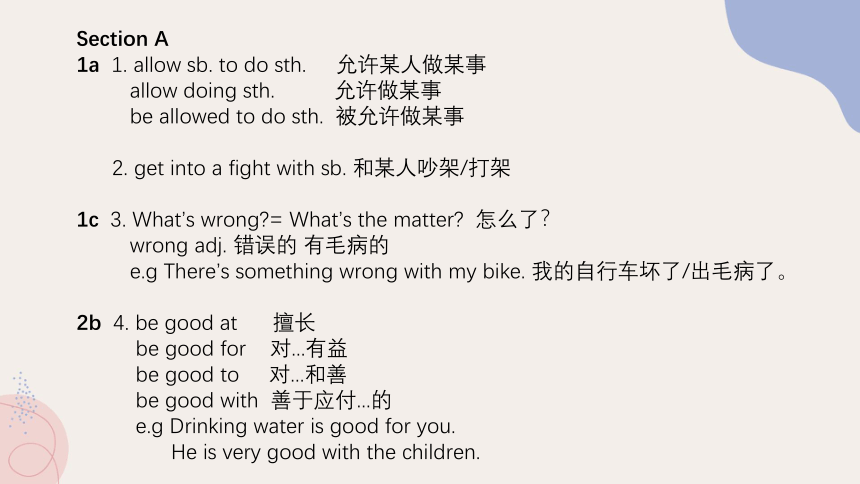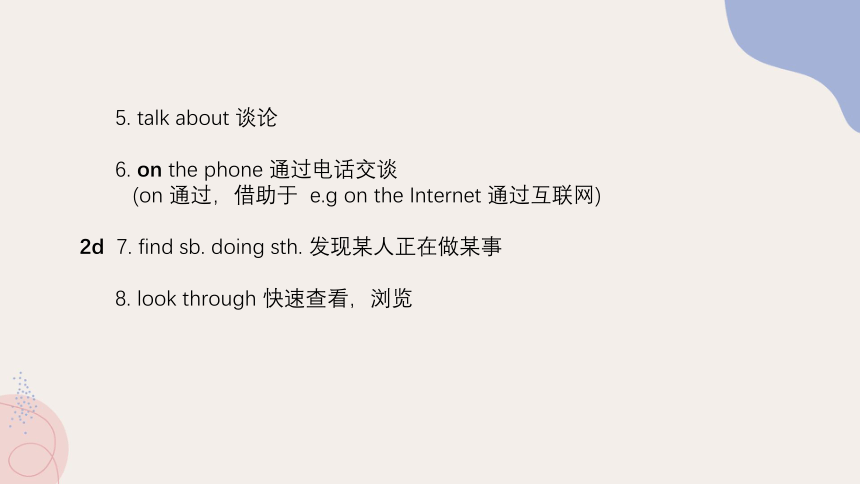人教版八年级英语下册 Unit 4 Why don't you talk to your parents? 知识点课件 (共18张PPT)
文档属性
| 名称 | 人教版八年级英语下册 Unit 4 Why don't you talk to your parents? 知识点课件 (共18张PPT) |  | |
| 格式 | pptx | ||
| 文件大小 | 52.5MB | ||
| 资源类型 | 教案 | ||
| 版本资源 | 人教新目标(Go for it)版 | ||
| 科目 | 英语 | ||
| 更新时间 | 2023-08-13 12:18:59 | ||
图片预览







文档简介
(共18张PPT)
Unit4 Why don't you talk to your parents
Why not do sth. = Why don’t you do sth. 你为什么不做某事呢?
单 词
复习 P117-118
重点掌握读音、拼写以及能够看到英文对应到中文意思
课文 & 语法知识
Section A
1a 1. allow sb. to do sth. 允许某人做某事
allow doing sth. 允许做某事
be allowed to do sth. 被允许做某事
2. get into a fight with sb. 和某人吵架/打架
1c 3. What’s wrong = What’s the matter 怎么了?
wrong adj. 错误的 有毛病的
e.g There’s something wrong with my bike. 我的自行车坏了/出毛病了。
2b 4. be good at 擅长
be good for 对...有益
be good to 对...和善
be good with 善于应付...的
e.g Drinking water is good for you.
He is very good with the children.
5. talk about 谈论
6. on the phone 通过电话交谈
(on 通过,借助于 e.g on the Internet 通过互联网)
2d 7. find sb. doing sth. 发现某人正在做某事
8. look through 快速查看,浏览
9. deal
① big deal 固定搭配,“重要的事情或状况”
It’s not a big deal. 没什么大不了的。
② It’s a deal. 就这么定了,一言为定
e.g ——Let’s meet at half past six.
——It’s a deal.
③ deal n. 协议 do/make a deal (with sb.) (与...)达成
v. 对付 deal with sth. 处理某事
10. work out 成功地发展 解决 “动副型短语”
3a 11. 表语从句
① 由句子充当另一个表语成分的句子
简单句 English is a useful tool.
表语从句 English is what I like most among all subjects.
② that/whether/特殊疑问词+陈述句
e.g (1) My problem is that I can’t get on with my family. 我的问题是我不能和我的家人和睦相处。
(2) The problem is whether he will come. 问题是他是否会来。
(3) This is what we need. 这就是我们所需要的。
12. get on/along with sb. 和某人和睦相处
get on/along with sth. 在...方面取得进展
e.g I’m not getting on very fast with the work. 我这项工作进展不是很快。
13. relation n.关系
14. I don’t know if I should say anything to them about this.
宾语从句:if/whether+陈述句 翻译为“是否”
15. argue with sb. 和某人争论
argue about sth. 就某事争论
16. 现在分词短语作后置定语 表主动含义
(1) When they argue, it’s like a big, black cloud hanging over our home.
就像大片乌云笼罩在我们家上空
(2) The boy looking at the picture is my brother.
看图片的那个男孩
(回顾)a special trained dog中过去分词短语作定语表被动含义
17. elder 年级较长的 只能用在名词前作定语
18. be nice/good/friendly/kind to sb. 对某人友好
19. instead 相反
e.g He never works. Instead, he plays all day and all night.
20. whatever pron.
① 任何
e.g You can eat whatever you like. 你可以吃任何你想吃的东西。
② 无论什么(=no matter what)
e.g You have our support, whatever you decide. 无论做什么决定,你都会得到我们的支持。
21. be nervous about sth. 对...感到紧张/焦虑
22. offer和provide都是 “提供”, 但用法不同
offer sb. sth.= offer sth. to sb. 提供给某人某物
offer to do sth. 主动做某事
provide sb. with sth.= provide sth. for sb. 提供给某人某物
23. proper 正确的,恰当的
municate with sb. 与某人沟通
25. explain sth. to sb. 向某人解释某事
mind sb. doing sth. 介意某人做某事
3c 26. make sth. +adj. 使得某事如何
make 使得 clear 清楚的
4b 27. return
① 归还 return sth. to sb. 把某物归还给某人
② 回来,返回 return to+地点名词 回到某地
return from 从...回来
4c 28. leave vs. forget
leave v.丢下
leave sth. +介词短语/副词(地点状语) 把某物忘在某地
forget v.(记忆上的)忘记
forget sth./doing sth./to do sth, 不可接地点状语
29. afraid 害怕的
① 害怕某人/某物 be afraid of sb./sth.
② 害怕做某事 be afriad of doing sth.= be afraid to do sth.
③ 恐怕 be afriad +that从句
30. not...any more= no more 不再
且no more在系动词be、情态动词或助动词后,实义动词之前。
e.g I will not copy his homework anymore.
=I will no more copy his homework.
Section B
1c 1. pressure =stress 压力,不可数名词
put pressure on sb. 向某人施压
2. compete with sb. 和某人竞争
competition n.
2b 3. the +姓氏的复数形式 指该姓氏夫妇二人或一家人,
表复数含义,作主语时谓语动词用复数形式。
e.g The Browns are used to living in China now.
4. typical 典型的
5. not...until... 直到...才...
e.g I didn’t finish my homework until my mother came back from work
last night.
6. It’s time for sth.= It’s time to do sth. 到了做某事的时间了
It’s time for sb. to do sth. 到了某人做某事的时间了
7. continue v.继续
continue to do sth. 继续做(另一件事)
continue doing sth. 继续做(同一件事)
8. be always doing sth. 总是/一直做某事(常含有厌恶、赞扬、抱怨等感情
色彩,并不表示某时刻正在发生的动作)
e.g She is always helping me out when I have difficulties. (赞扬)
9. compare A with B 把A与B比较
compare A to B 把A比作B
e.g We often compare children to flowers.
10. crazy 疯狂的,不理智的
be crazy about ... 热衷于...
11. push v.
① 推
② 督促 push sb. to do sth. 督促某人做某事
12. develop development 发展
(v.) (n.)
13. cause v. 造成
cause sb. to do sth. 导致某人做某事
cause n. 原因
e.g What was the cause of the fire
3b 14. opinion 观点,看法
in one’s opinion 依...看
【借鉴】作文中常用“In my opinion, we should ...”
“在我看来, 我们应该......” 这个句子表达自己的观点
15. perhaps= probably= maybe 也许,可能
Self Check2
16.
Unit4 Why don't you talk to your parents
Why not do sth. = Why don’t you do sth. 你为什么不做某事呢?
单 词
复习 P117-118
重点掌握读音、拼写以及能够看到英文对应到中文意思
课文 & 语法知识
Section A
1a 1. allow sb. to do sth. 允许某人做某事
allow doing sth. 允许做某事
be allowed to do sth. 被允许做某事
2. get into a fight with sb. 和某人吵架/打架
1c 3. What’s wrong = What’s the matter 怎么了?
wrong adj. 错误的 有毛病的
e.g There’s something wrong with my bike. 我的自行车坏了/出毛病了。
2b 4. be good at 擅长
be good for 对...有益
be good to 对...和善
be good with 善于应付...的
e.g Drinking water is good for you.
He is very good with the children.
5. talk about 谈论
6. on the phone 通过电话交谈
(on 通过,借助于 e.g on the Internet 通过互联网)
2d 7. find sb. doing sth. 发现某人正在做某事
8. look through 快速查看,浏览
9. deal
① big deal 固定搭配,“重要的事情或状况”
It’s not a big deal. 没什么大不了的。
② It’s a deal. 就这么定了,一言为定
e.g ——Let’s meet at half past six.
——It’s a deal.
③ deal n. 协议 do/make a deal (with sb.) (与...)达成
v. 对付 deal with sth. 处理某事
10. work out 成功地发展 解决 “动副型短语”
3a 11. 表语从句
① 由句子充当另一个表语成分的句子
简单句 English is a useful tool.
表语从句 English is what I like most among all subjects.
② that/whether/特殊疑问词+陈述句
e.g (1) My problem is that I can’t get on with my family. 我的问题是我不能和我的家人和睦相处。
(2) The problem is whether he will come. 问题是他是否会来。
(3) This is what we need. 这就是我们所需要的。
12. get on/along with sb. 和某人和睦相处
get on/along with sth. 在...方面取得进展
e.g I’m not getting on very fast with the work. 我这项工作进展不是很快。
13. relation n.关系
14. I don’t know if I should say anything to them about this.
宾语从句:if/whether+陈述句 翻译为“是否”
15. argue with sb. 和某人争论
argue about sth. 就某事争论
16. 现在分词短语作后置定语 表主动含义
(1) When they argue, it’s like a big, black cloud hanging over our home.
就像大片乌云笼罩在我们家上空
(2) The boy looking at the picture is my brother.
看图片的那个男孩
(回顾)a special trained dog中过去分词短语作定语表被动含义
17. elder 年级较长的 只能用在名词前作定语
18. be nice/good/friendly/kind to sb. 对某人友好
19. instead 相反
e.g He never works. Instead, he plays all day and all night.
20. whatever pron.
① 任何
e.g You can eat whatever you like. 你可以吃任何你想吃的东西。
② 无论什么(=no matter what)
e.g You have our support, whatever you decide. 无论做什么决定,你都会得到我们的支持。
21. be nervous about sth. 对...感到紧张/焦虑
22. offer和provide都是 “提供”, 但用法不同
offer sb. sth.= offer sth. to sb. 提供给某人某物
offer to do sth. 主动做某事
provide sb. with sth.= provide sth. for sb. 提供给某人某物
23. proper 正确的,恰当的
municate with sb. 与某人沟通
25. explain sth. to sb. 向某人解释某事
mind sb. doing sth. 介意某人做某事
3c 26. make sth. +adj. 使得某事如何
make 使得 clear 清楚的
4b 27. return
① 归还 return sth. to sb. 把某物归还给某人
② 回来,返回 return to+地点名词 回到某地
return from 从...回来
4c 28. leave vs. forget
leave v.丢下
leave sth. +介词短语/副词(地点状语) 把某物忘在某地
forget v.(记忆上的)忘记
forget sth./doing sth./to do sth, 不可接地点状语
29. afraid 害怕的
① 害怕某人/某物 be afraid of sb./sth.
② 害怕做某事 be afriad of doing sth.= be afraid to do sth.
③ 恐怕 be afriad +that从句
30. not...any more= no more 不再
且no more在系动词be、情态动词或助动词后,实义动词之前。
e.g I will not copy his homework anymore.
=I will no more copy his homework.
Section B
1c 1. pressure =stress 压力,不可数名词
put pressure on sb. 向某人施压
2. compete with sb. 和某人竞争
competition n.
2b 3. the +姓氏的复数形式 指该姓氏夫妇二人或一家人,
表复数含义,作主语时谓语动词用复数形式。
e.g The Browns are used to living in China now.
4. typical 典型的
5. not...until... 直到...才...
e.g I didn’t finish my homework until my mother came back from work
last night.
6. It’s time for sth.= It’s time to do sth. 到了做某事的时间了
It’s time for sb. to do sth. 到了某人做某事的时间了
7. continue v.继续
continue to do sth. 继续做(另一件事)
continue doing sth. 继续做(同一件事)
8. be always doing sth. 总是/一直做某事(常含有厌恶、赞扬、抱怨等感情
色彩,并不表示某时刻正在发生的动作)
e.g She is always helping me out when I have difficulties. (赞扬)
9. compare A with B 把A与B比较
compare A to B 把A比作B
e.g We often compare children to flowers.
10. crazy 疯狂的,不理智的
be crazy about ... 热衷于...
11. push v.
① 推
② 督促 push sb. to do sth. 督促某人做某事
12. develop development 发展
(v.) (n.)
13. cause v. 造成
cause sb. to do sth. 导致某人做某事
cause n. 原因
e.g What was the cause of the fire
3b 14. opinion 观点,看法
in one’s opinion 依...看
【借鉴】作文中常用“In my opinion, we should ...”
“在我看来, 我们应该......” 这个句子表达自己的观点
15. perhaps= probably= maybe 也许,可能
Self Check2
16.
同课章节目录
- Unit 1 What's the matter?
- Section A
- Section B
- Unit 2 I'll help to clean up the city parks.
- Section A
- Section B
- Unit 3 Could you please clean your room?
- Section A
- Section B
- Unit 4 Why don't you talk to your parents?
- Section A
- Section B
- Unit 5 What were you doing when the rainstorm came
- Section A
- Section B
- Review of Units 1-5
- Unit 6 An old man tried to move the mountains.
- Section A
- Section B
- Unit 7 What's the highest mountain in the world?
- Section A
- Section B
- Unit 8 Have you read Treasure Island yet?
- Section A
- Section B
- Unit 9 Have you ever been to a museum?
- Section A
- Section B
- Unit 10 I've had this bike for three years.
- Section A
- Section B
